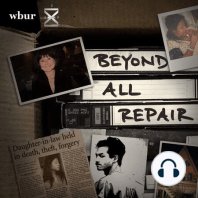48 min listen
Trailer: Introducing 'Violation'
ratings:
Length:
3 minutes
Released:
Mar 8, 2023
Format:
Podcast episode
Description
In 1986, while on a summer camp trip to the Grand Canyon, 16-year-old Jacob Wideman fatally stabbed his roommate, Eric Kane. Jacob confessed to the murder, but couldn’t explain why he did it.
The crime devastated both boys’ families. For the Widemans, it was also a haunting echo from their family history.
Just two years earlier, Jacob’s father, acclaimed author John Edgar Wideman, had published "Brothers and Keepers," a memoir that grappled with how his brother, Jacob’s uncle Robby Wideman, was sentenced to life in prison for his role in a fatal robbery. How could another inexplicable crime happen twice in two generations?
Jacob served decades behind bars for killing Eric Kane. Then in 2016, an Arizona parole board granted him house arrest. Jacob’s release outraged his victim’s family.
It wasn’t long before Jacob was back before the board, fighting again for his freedom.
Violation, a new podcast from The Marshall Project and WBUR, tells the story of how this horrible crime has connected two families for decades. It explores suffering and retribution, as well as power and privilege. It also pulls back the curtain on parole boards — powerful, secretive, largely political bodies that control the fates of thousands of people every year.
Hosted and reported by The Marshall Project’s Beth Schwartzapfel, Violation debuts on March 22, with new episodes every Wednesday.
The crime devastated both boys’ families. For the Widemans, it was also a haunting echo from their family history.
Just two years earlier, Jacob’s father, acclaimed author John Edgar Wideman, had published "Brothers and Keepers," a memoir that grappled with how his brother, Jacob’s uncle Robby Wideman, was sentenced to life in prison for his role in a fatal robbery. How could another inexplicable crime happen twice in two generations?
Jacob served decades behind bars for killing Eric Kane. Then in 2016, an Arizona parole board granted him house arrest. Jacob’s release outraged his victim’s family.
It wasn’t long before Jacob was back before the board, fighting again for his freedom.
Violation, a new podcast from The Marshall Project and WBUR, tells the story of how this horrible crime has connected two families for decades. It explores suffering and retribution, as well as power and privilege. It also pulls back the curtain on parole boards — powerful, secretive, largely political bodies that control the fates of thousands of people every year.
Hosted and reported by The Marshall Project’s Beth Schwartzapfel, Violation debuts on March 22, with new episodes every Wednesday.
Released:
Mar 8, 2023
Format:
Podcast episode
Titles in the series (26)
Heart Tests: We follow Jacob Wideman’s decades-long journey through the Arizona prison system and hear how he prepared to tell his life story to the parole board. by Beyond All Repair
